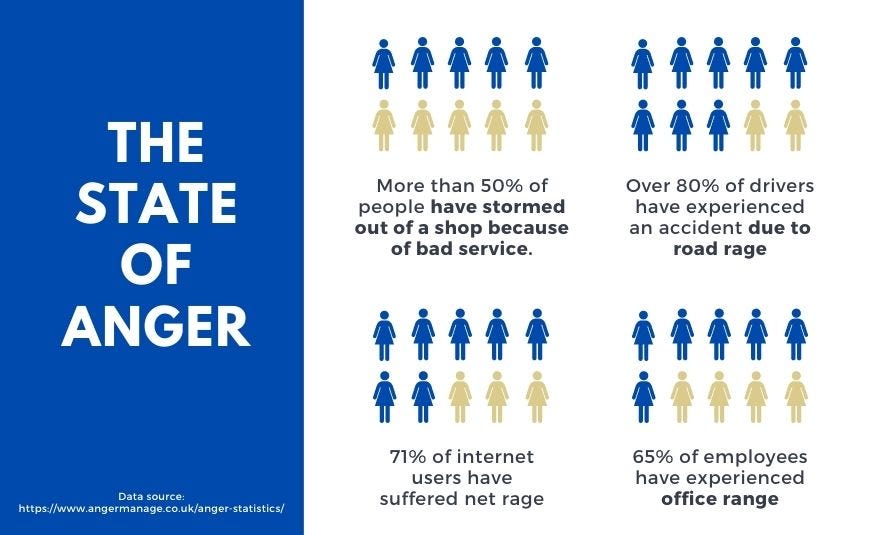Keeping a tab on emotions is not an easy task. They can run wild at a moment’s notice. Anger, frustration, and worry are perhaps the worst to tackle, and it’s often in hindsight that you’ll wallow in regret.
Take anger, for instance. Whether it’s bad customer service, a difficult colleague, or a slow internet connection, emotions could escalate from displeasure to outrage within seconds.
Here are some stats to put things in perspective.

Heightened emotions can cloud your mind. It can affect your ability to think straight, make objective decisions, and separate right from wrong and fact from fiction. This is when you’re most likely to make mistakes.
And mistakes are sometimes irreversible and costly. Often, the cost is a severed relationship, a lost opportunity, or even impaired mental and physical health. So the importance of keeping your emotions in check doesn’t need much explanation.
But not everyone can go into a Zen state in an instant. It takes years of practice to master. So, until then, you need a few practical techniques to get hold of your emotions during those intense moments when all rationality evades you.
1. Conscious deep breathing
Create an instant shift in your mental and physical state.

You’ve likely read this advice already somewhere. But there are two key reasons why deep breathing demands such emphasis. First, it’s a simple technique that you can practice anywhere, even when you’re in the middle of a crowd. Also, it can provide instant results with noticeable shifts in your mental and physical state.
So, how does conscious deep breathing work? Take a deep, slow, and steady breath while counting to five. Hold it for five counts and exhale slowly for seven more counts.
Repeat this a few times. You will often see results after just 3–4 rounds of deep breathing. This is mainly due to two important mental and physiological shifts.
1. A momentary distraction for your mind
The human mind can only focus on one object at a time. So when you are intensely focused on a negative event and clouded by emotions, changing your focus to another object is the easiest way to change your emotional state.
And this is what mindful breathing helps you to achieve.
2. Slow, deep breathing changes your physiology
Elevated emotions can trigger distinct reactions in your body, like rapid breathing, heightened blood pressure, and a rise in body temperature.
But slow deep breathing can lead to a different set of physiological responses. It can activate the parasympathetic nervous system and decrease cortisol, the body’s stress hormone. And it can help lower your blood pressure levels and heart rate and relieve muscle tension. Scientists have also found that it can increase the low-frequency alpha brainwaves, which are found in REM sleep and deeply relaxed states.
This is why deep breathing is taught as a relaxation technique for individuals experiencing anxiety and depression. Breathing exercises are also an important part of yoga and meditation for these very reasons.
2. Just wait
Disengage to gain clarity.

Taking time out is important to disengage from the source of your emotional distress. This will help clear your head before responding, so you can avoid instantaneous reactions that you’ll later regret.
And similar to negative emotions, positive ones could also make you lose sight of reality. For example, research suggests that being overly cheerful could lead you to underestimate the possibility of a negative consequence. Evidently, whether you’re feeling happy, sad, or angry, unguarded emotional reactions could have equally undesirable outcomes.
So, the next time you face an emotionally-charged situation that doesn’t require immediate action, just wait!
This two-word wisdom can save you from costly mistakes and regret.
3. Choose your battles
Assess whether it’s worth your time.

Getting emotionally invested in all that crosses your path could sap your energy and leave you drained. It could take your time and attention away from things that truly matter. And some battles are just not worth the fight. So, being selective about what you pursue and choosing when to disengage is essential.
Adopt Pareto’s 80:20 rule
Put your time and energy into the 20% that truly matter. They’re the ones that will make a positive difference. And just let go of the rest because they’re not worth the effort.
Intense human emotions can serve to protect you and ensure your survival with fight-or-flight responses. However, repeated emotional reactions could have a long-term effect on your physical and mental wellbeing. It can even weaken the immune system and lead to mental health disorders like depression and anxiety in the long run. So, all the more reason for you to protect your emotions from running wild.


